At the 2024 Annual Meeting of the Indiana CTSI on September 20, hundreds of investigators, trainees, staff and community members from across Indiana convened in Indianapolis both in-person and virtually to learn about transformative developments in precision health.
The theme of the meeting was “Precision to Population,” and it showcased the diverse lines of inquiry and transformative applications of translational research in Indiana and beyond.
Additionally, the meeting showcased the many ways in which the Indiana CTSI has directly enabled and advanced many of these discoveries through its funding opportunities, programs and other services. Indiana CTSI Co-Directors Sharon Moe, MD, and Sarah Wiehe, MD, MPH, highlighted how many of the speakers engaged with and benefited from Indiana CTSI resources in their introductory remarks.
Keynote Address
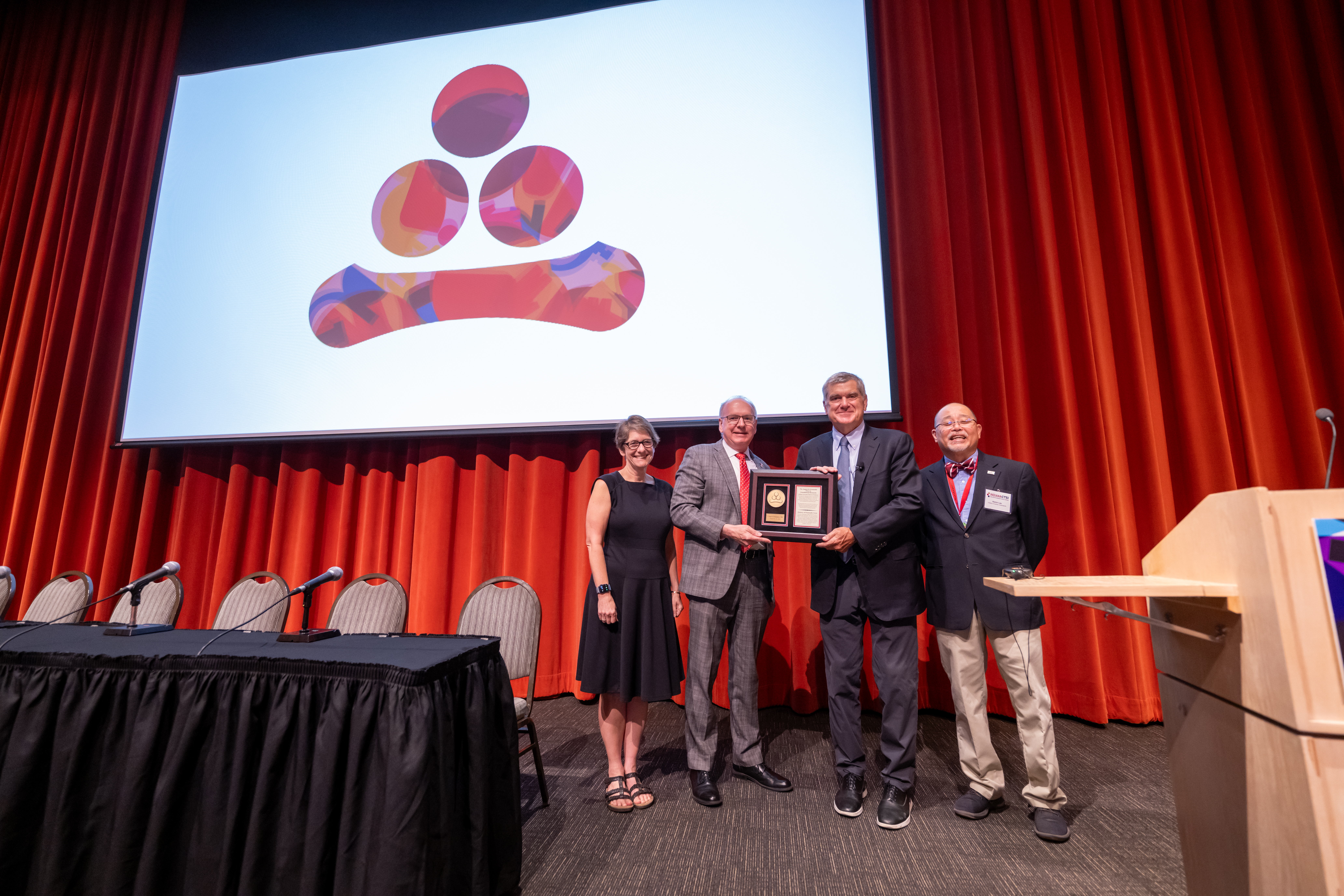
Dr. Thompson accepts the Watanabe Prize award from Dr. Jay Hess, alongside Dr. Tatiana Foroud and Dr. Kelvin Lee.
Craig B. Thompson, MD, of Sloan Kettering Memorial Cancer Center, delivered the keynote address, “Translational Research Starts in the Clinic.” Thompson, who is the winner of the 2024 August M. Watanabe Prize in Translational Research, has radically advanced medicine’s understanding of cellular metabolism and its role in disease and cancer. He has translated his discoveries into revolutionary cancer therapeutics.
During his address, Thompson shared many of the scientific, clinical and personal insights he’s earned over the course of his distinguished career.
“It’s important to remember that we don’t cause these diseases; we need to understand their underpinnings, treat them, and translate [our work] to the public,” he said during his address. “We need to communicate these treatments and make them equitable.”
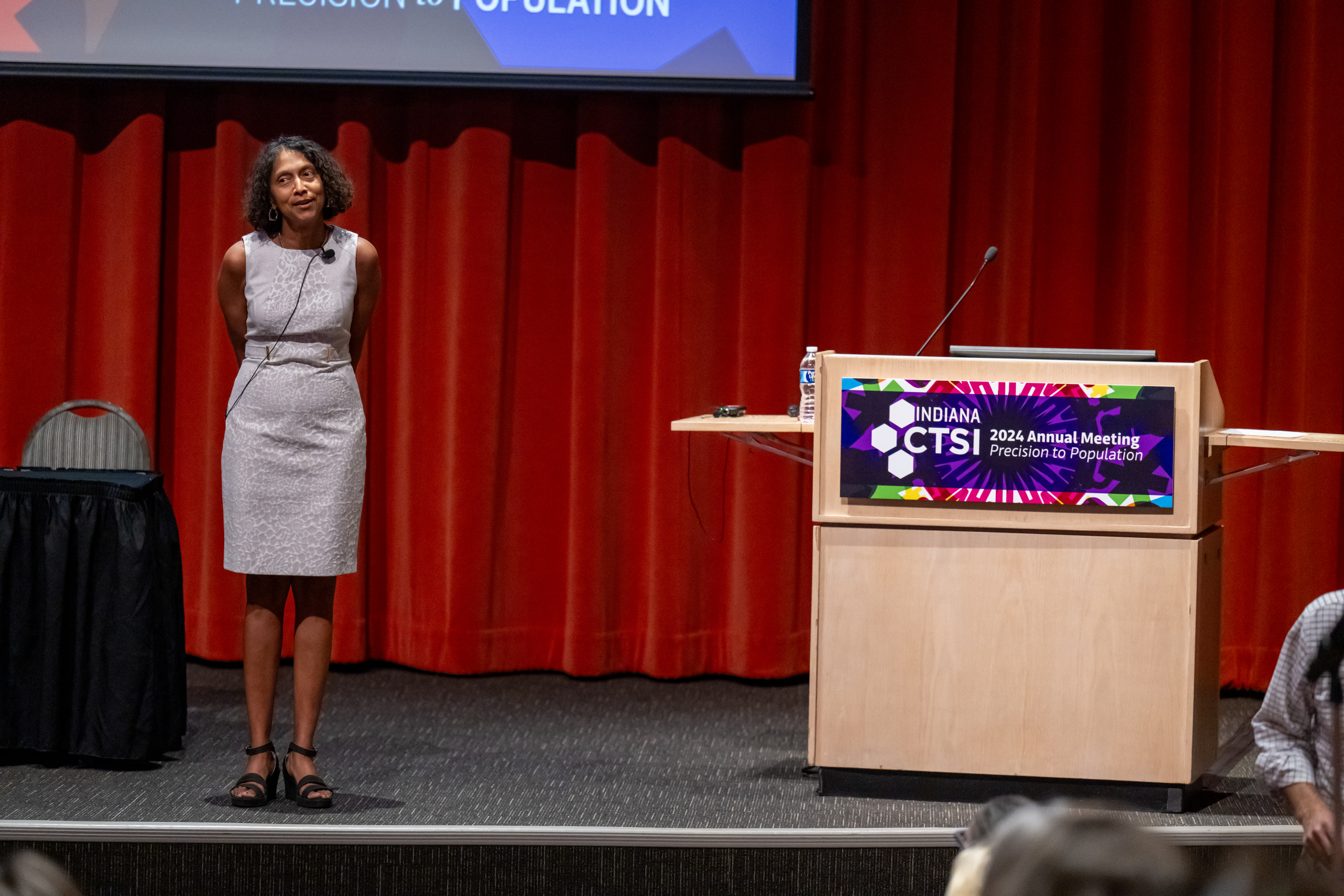
Dr. Kosali Simon
Morning Session: “Precision to Population Around the State”
The morning session featured three presentations on different uses of data to improve human health.
In her presentation, “Use of Large Administrative and Survey Data for Population Health Research,” Kosali Simon, PhD, of Indiana University Bloomington, spoke about her experiences conducting research with this kind of data, as well as some of the advantages and challenges of using these large data sets.
She also discussed her role in the Research Data Commons, a newly-launched initiative that will serve as IU’s “front door” to research infrastructure.
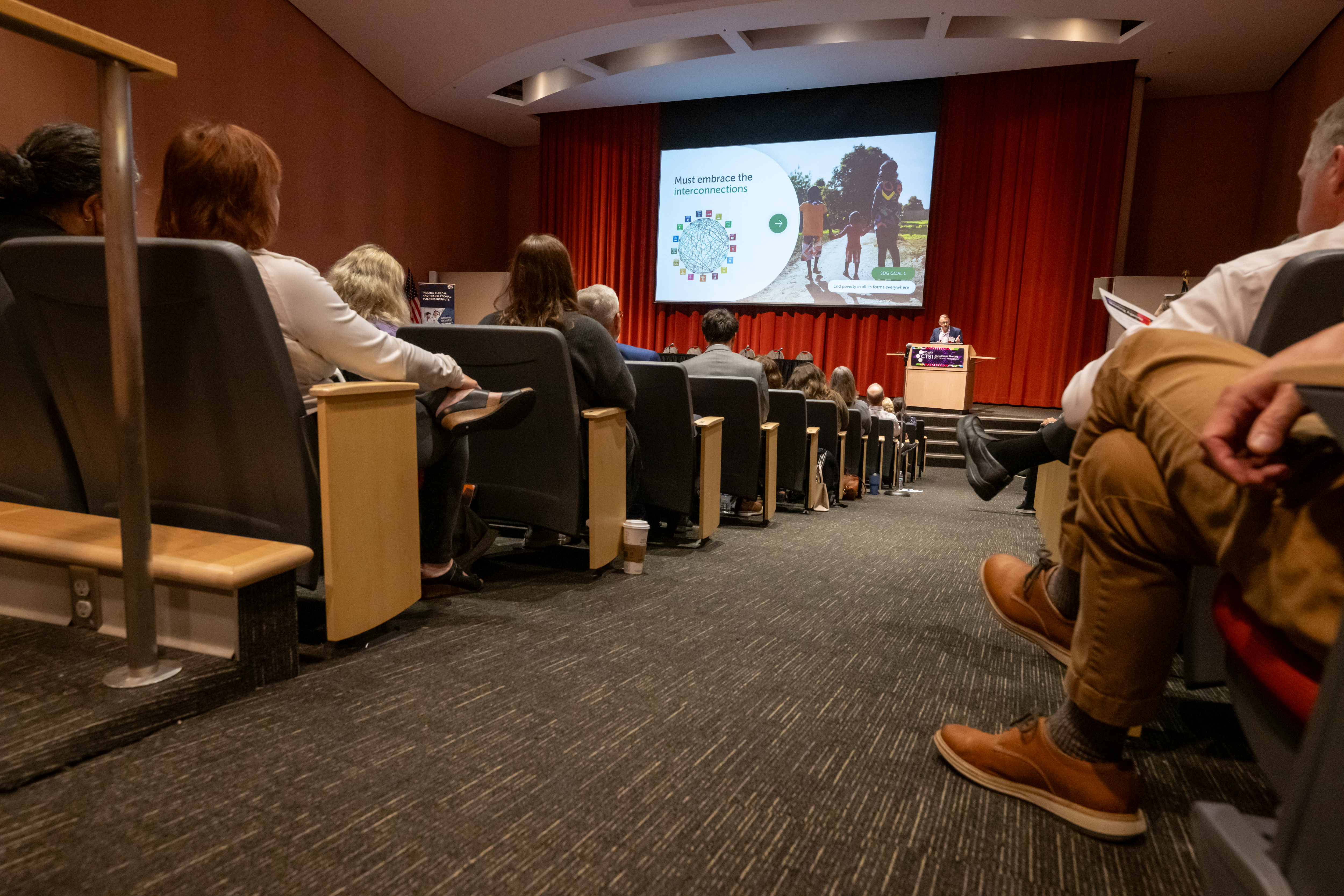
Attendees listen to Dr. Jason Rohr speak.
Jason Rohr, PhD, of the University of Notre Dame, shared the results of his recent project reducing schistosomiasis infection in a community Senegal. Schistosomiasis is caused by parasitic worms that thrive in invasive aquatic vegetation in the community’s water source. In his presentation, “Clinical Trials in Africa to Enhance Health, Improve Sustainability, and Reduce Poverty,” Rohr shared how his team aided the community in converting the vegetation into compost and fertilizer, which both reduced their risk of infection and improved the sustainability of their agricultural practices.
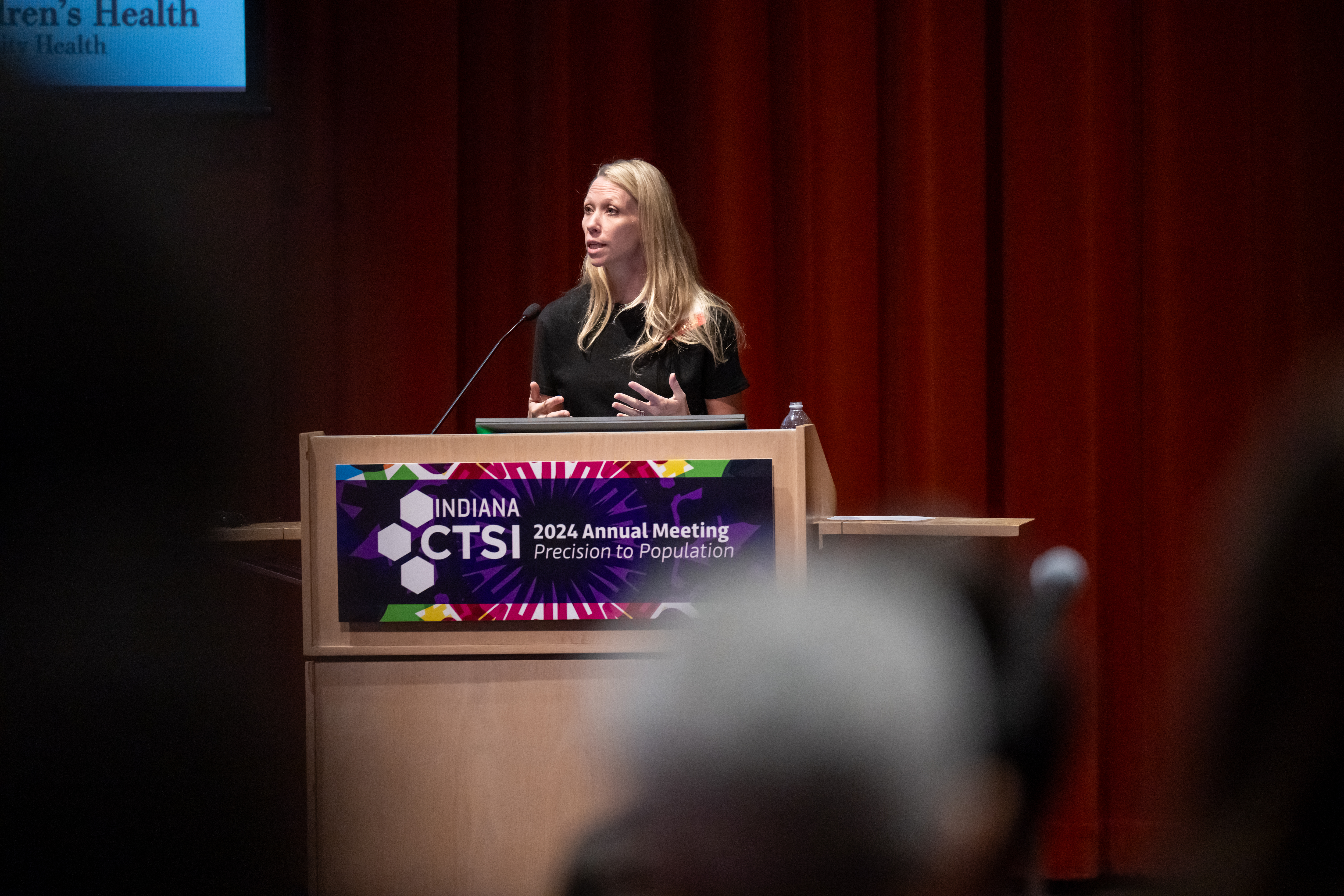
Dr.Rebecca McNally Keehn
In “Enhancing Equitable Autism Diagnosis: Translating Eye-Tracking Biomarkers to Primary Care,” collaborators Rebecca McNally Keehn, PhD, of IU School of Medicine, and Brandon Keehn, PhD, of Purdue University, presented their respective research, which demonstrated that primary care providers can play an important role in dismantling barriers to autism evaluation. McNally Keehn first shared her work studying the diagnostic accuracy of autism within the EAE Hub framework, and Keehn expanded on her findings, showing that a new diagnostic tool that tracks eye movement can be deployed in a primary care setting.
Afternoon Session: “Population to Precision Around the State”
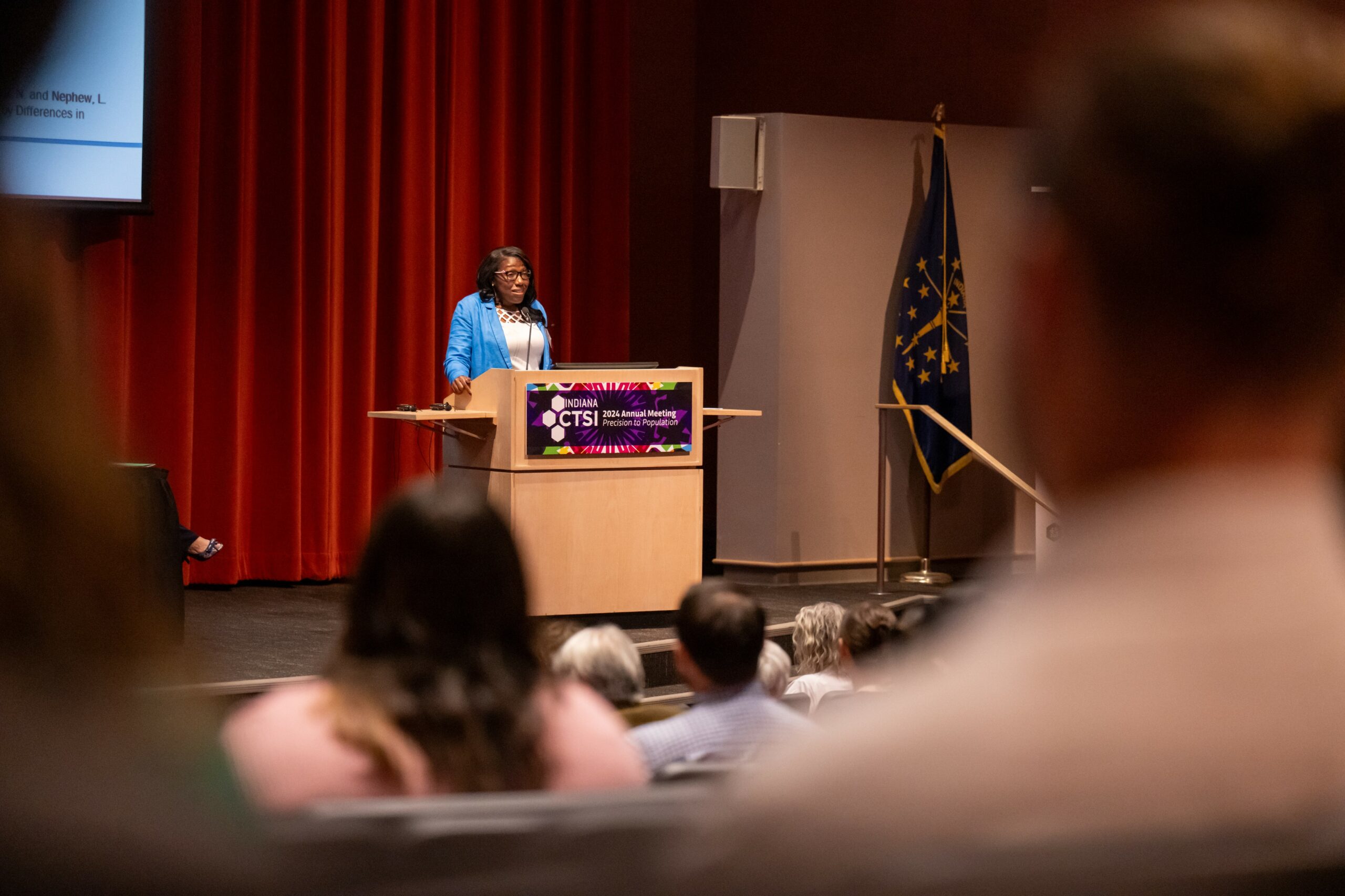
Dr. Lauren Nephew
During the afternoon session, three speakers shared their work and led a conversation with a volunteer who had participated in research. This gave attendees the opportunity to hear valuable insights from community members—the people who both shape and are directly impacted by the results of translational research.
Lauren D. Nephew, MD, MA, MSCE, presented her work, “Liver Link: A Stakeholder-Driven Intervention to Improve Access to Curative Therapies for Liver Cancer.” Connie Carroll, who helped shape the design of the study through Research Jam , spoke about her experience both as a patient and as a Research Jam participant.
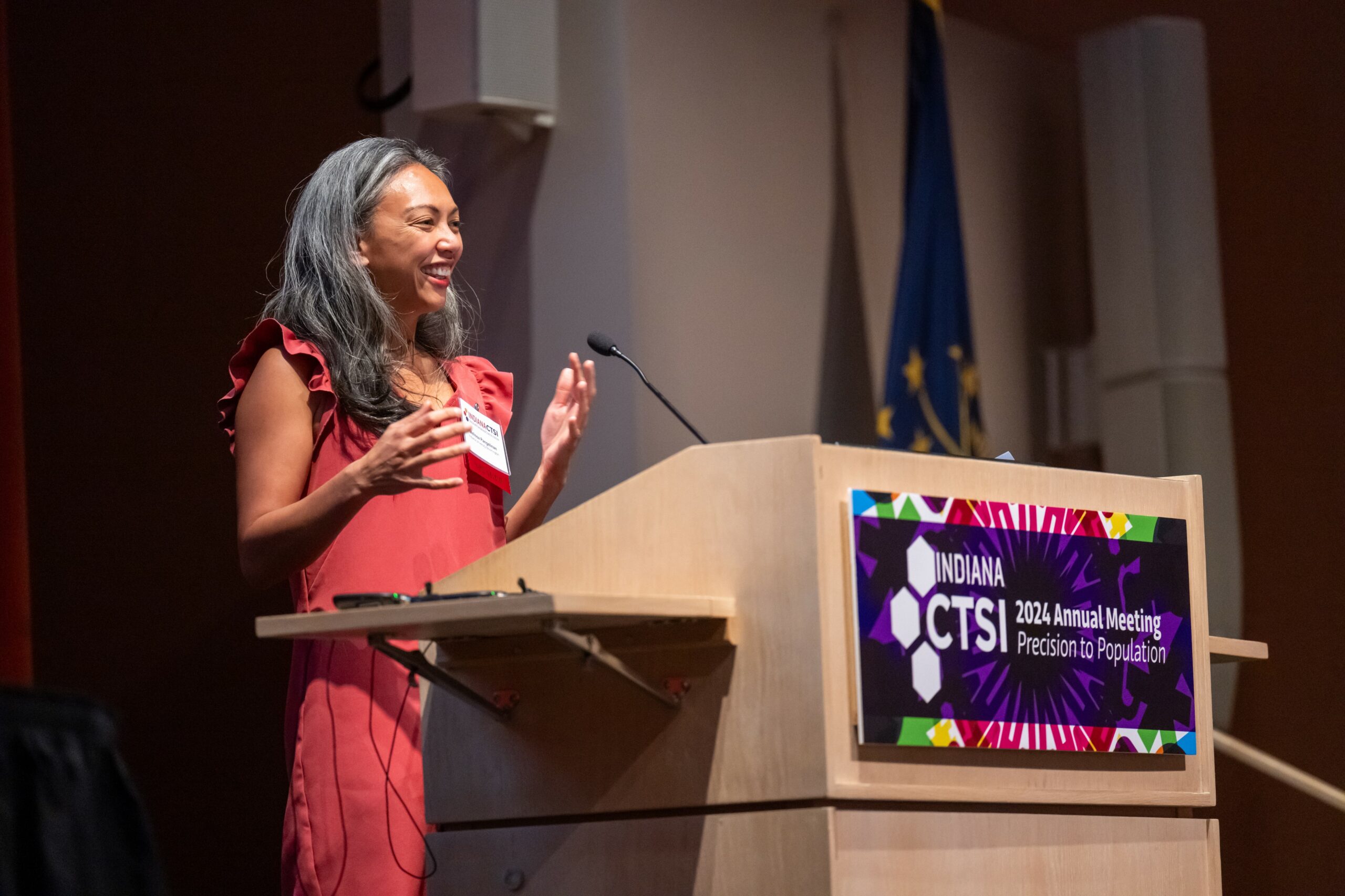
Dr. Melissa Pangelinan
For Carroll, who said she had been quite isolated following her treatment for liver cancer, the opportunity to participate in Research Jam was both fun and rewarding.
“To come out and share with others, and to invest what I had missed in my own treatment preparation [to help new patients]—it was one hundred percent worth every second,” she said.
In “Strategic Initiatives to Increase Engagement and Participation of Under-Represented Communities in Health Knowledge Dissemination and Research,” Melissa Pangelinan, PhD, discussed the aims and objectives of All IN for Health, of which she is the new executive director.
All IN advisory board member and retired social worker Gary Ratliff, MSW, also discussed his experience serving on the advisory board, which he initially joined to advocate for mental health research. An active research volunteer, Ratliff also shared that he has gained valuable insights about his own health through his participation in research.
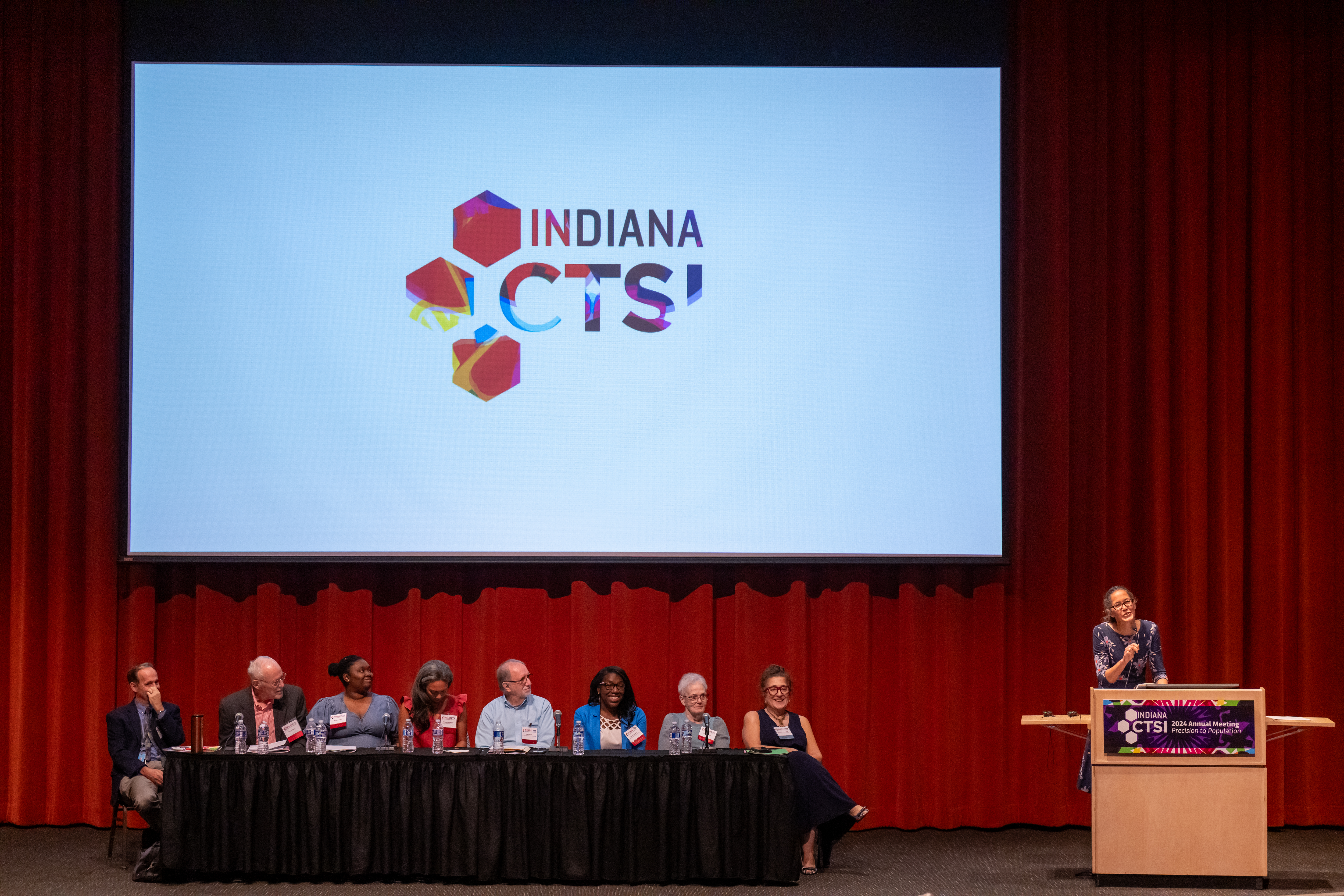
Dr. Sarah Wiehe stands at the podium next to the afternoon panel. The panel was comprised of both researchers and community members.
He said that he appreciated opportunities like this one to speak at the Annual Meeting, where he could “get the message out” to researchers about how they can improve communication with patients.
The afternoon session closed with Peter Schwartz, MD, PhD, who presented “A Public Deliberation: 24 Lay People Deciding Over 4 Days How Biobanks Should be Run.” Ashanti Kelly and Bryce Mosely were part of the group of 24 community members who participated in the public deliberation, and they both spoke about why they chose to participate.
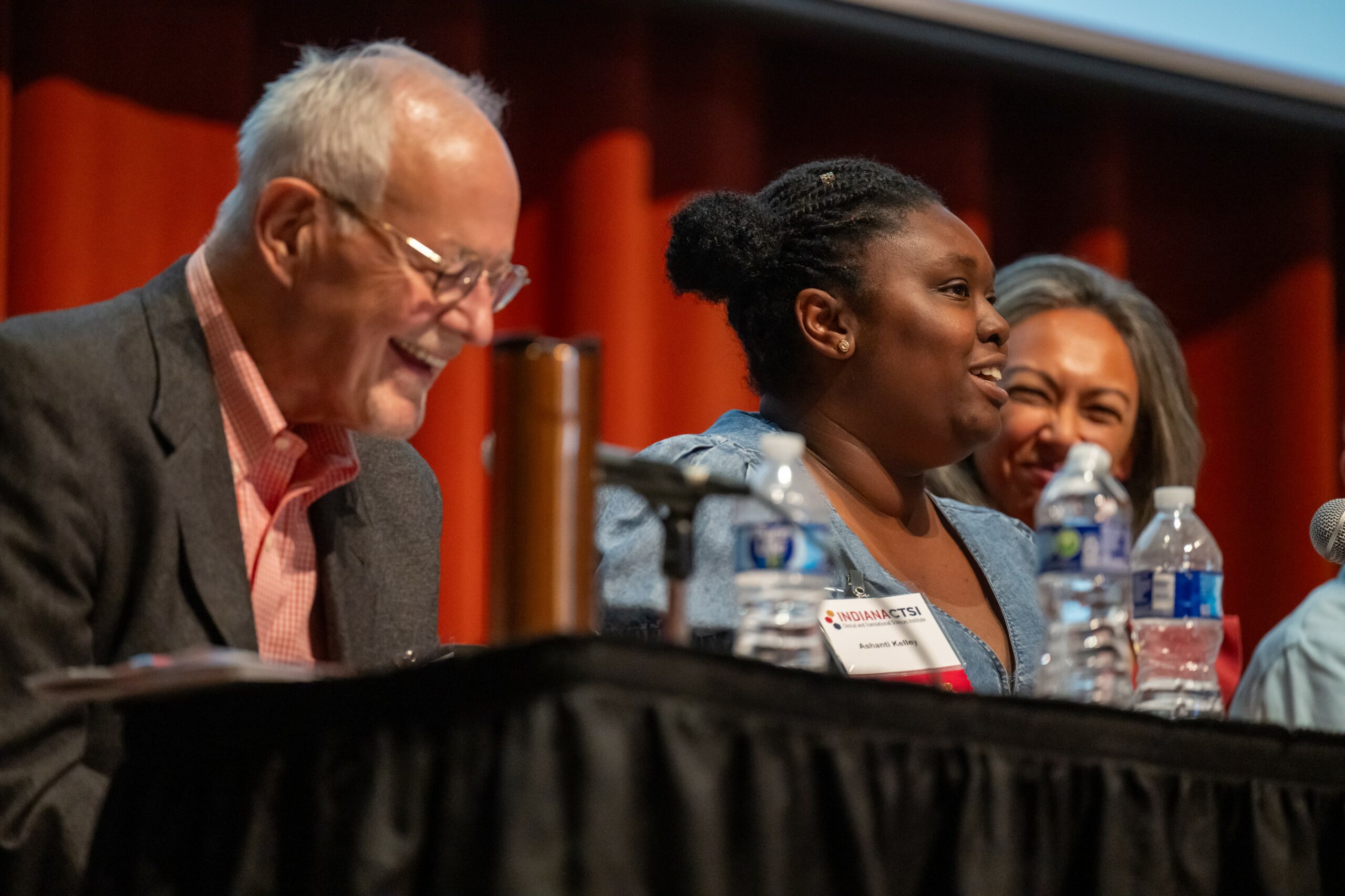
Ashanti Kelly shares her experience participating in the Public Deliberation.
“Many of us didn’t know what biobanking fully entailed, and so it was nice to talk in a deliberative way and see what everyone thought about it,” said Kelly. She elaborated on how the deliberants raised thoughtful questions, came to new insights, and shared divergent opinions informed by their respective experiences throughout the deliberation.
Plenary Address
The plenary speaker was Adriana Hung, MD, PhD, a nephrologist and epidemiologist at Vanderbilt University who works with large datasets to study genetic risks for chronic kidney disease.
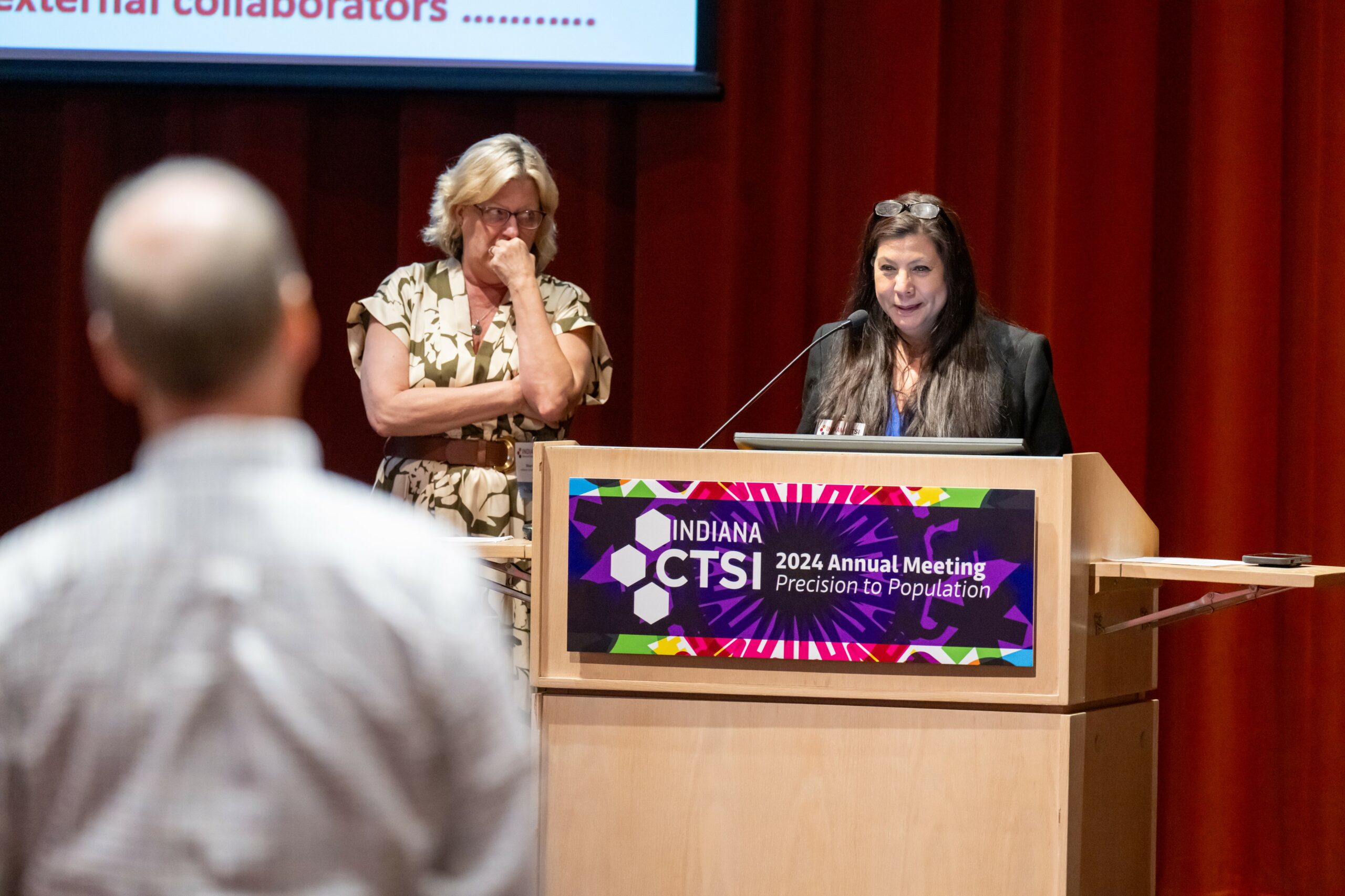
Dr. Adriana Hung takes a question from the audience after her presentation at the 2024 Annual Meeting.
During her address, “APOL1 Renal Protective Variant N264K: From Epidemiology to In Vitro Studies,” Hung presented her work exploring a genetic risk factor common in Black individuals with West African ancestry. Using the VA Health Care Million Veterans Program (MVP), a genetic biobank, Hung found that two protective genes offset the negative risk. People with these protective genes are less likely to have progressive kidney disease and may even be able to safely donate a kidney for transplantation.
Honorees
The Indiana CTSI honored two leaders who have made outstanding contributions to clinical and translational research.
First, Margie E. Snyder, PharmD, MPH, FCCP, FAPhA, presented Indiana CTSI Co-Director Sharon Moe, MD, with the inaugural CTSI Mentoring Excellence Award in Clinical and Translational Research, citing her prolific research record and her dedication to fostering the next generation of clinical and translational researchers.
“Dr. Moe’s mentorship work has led to exponential growth in the next generation of clinical translational researchers who have and will continue to work from bench to bedside, focusing on improving healthcare outcomes and the lives of patients,” said Snyder.
Moe and Wiehe then announced a special recognition for Kurt Kroenke, MD, the former director of the degree program in clinical research and whose storied leadership led to the establishment of the KL2 Early Career Investigator awards, TL1 Predoctoral Fellowship awards, and countless careers in clinical and translational research.
Kroenke honored at Indiana CTSI annual event (Regenstrief Institute)
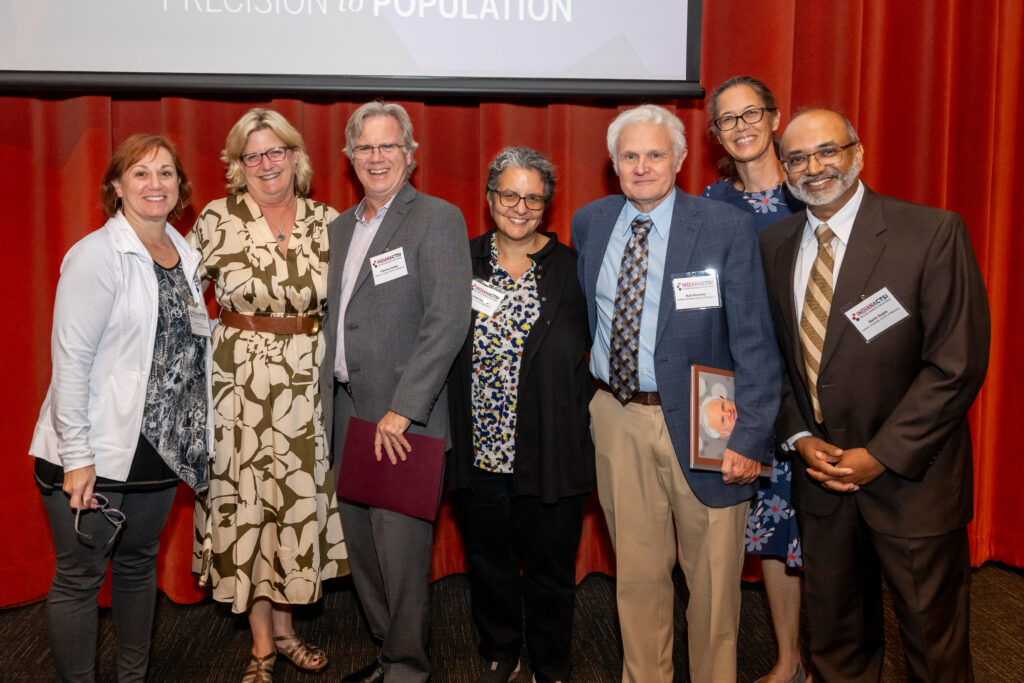
Dr. Kurt Kroenke (third from right) poses with Dr. Tammy Sajdyk, Dr. Sharon Moe, Dr. Thomas Hurley, Dr. Linda DiMeglio, Dr. Sarah Wiehe, and Dr. Samir Gupta.
Kurt Kroenke Poster Awards
Finally, during the meeting, attendees had the opportunity to view 37 posters and engage with their presenters. These posters, submitted by high school students, trainees and faculty, displayed an array of work being conducted across the research spectrum using Indiana CTSI resources.
Winners
- K12 Scholar: Tarik K. Yuce, MD
Indiana University School of Medicine | Surgery
“The Impact of Preoperative Glucagon-Like Peptide-1 Receptor Agonists (GLP-1RA) Utilization on Bariatric Surgery Outcomes” - T32 Postdoctoral Fellow: Caitlyn A. Thomas, PhD
University of Notre Dame | Chemistry & Biochemistry
“Adjuvants for the Potentiation of the Activity of -Lactam Antibiotics Against Methicillin-Resistant Staphylococcus aureus” - Investigator: Clayton Hicks, BA, BS
Indiana University School of Medicine
“’We had no idea what to ask’: Development and Co-Design of Osteosarcoma Surgical Discussion Cards for Use at Diagnosis” - Investigator: Julie Pike, RDN, CDCES
Indiana University School of Medicine | Department of Pediatrics
“A Tailored Approach to Increase Engagement in Lifestyle Change Programs in Women with Previous Gestational Diabetes” - Investigator: Chaylen Andolino
Purdue University, Department of Nutrition Science
“Ferroptosis Regulation by Fatty Acid Synthase-Derived Lipid Droplets in Model of Breast Cancer Metastasis” - Investigator: Punyatoya Panda
Purdue University | Department of Comparative Pathobiology
“Age-dependent changes in mouse brain and liver lipidome”
As always, the Indiana CTSI is grateful for the opportunity to convene researchers and community members from around the state to learn from, collaborate with and inspire one another. The next Annual Meeting will be held in Indianapolis on September 19, 2025.
Thank you, volunteers!
The 2024 Annual Meeting of the Indiana CTSI was made possible by an outstanding group of volunteers.

The volunteer team poses together at the main check-in table. Seated (left to right) are Joanne Davies and Fatma Niang. Standing (left to right) are Keier Dante, Rachel Bennett, Deidre Gray, Amy Trullinger, Rachel Mandeville, Brian Kortepeter, Maddie Kovarik and Cynthia Johnson.
